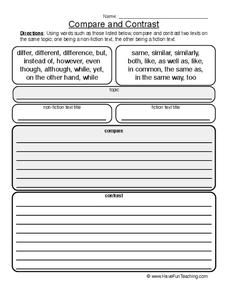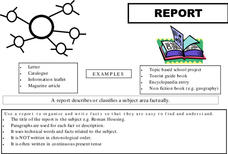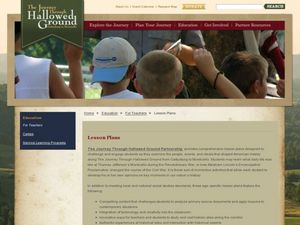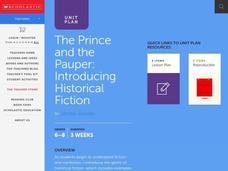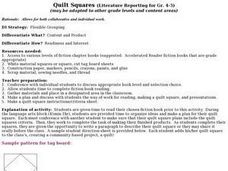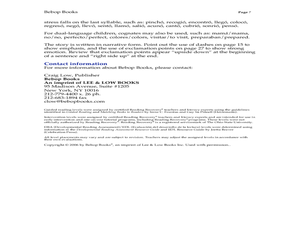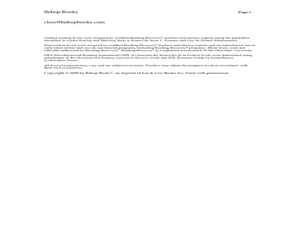The New York Times
Fiction or Nonfiction? Considering the Common Core's Emphasis on Informational Text
Nothing aids in comprehension more than an explanation and understanding of why things are done. Address why the Common Core requires the reading percentages that it established and analyze how this affects your readers. Learners read...
Curated OER
Elements of Fiction
The metaphor of a pot of soup and a series of colorful templates remind young writers of the elements that make for a rich story. Pepper the plot with carrot/character, potato/point of view, corn/conflict, tomato/theme, and season with...
Curated OER
Introducing the Essay: Twain, Douglass, and American Non-Fiction
Students analyze American essayists Mark Twain and Frederick Douglass in an introduction to American literary non-fiction writing. In this essay history lesson, students identify methods for writing essays. Students read and analyze...
Have Fun Teaching
Compare and Contrast (3)
Sometimes the way a topic is presented in fiction can be very different from how it is in reality. Compare and contrast a topic from both a fiction and nonfiction source with a graphic organizer that prepares kids to write about what...
Curated OER
Non Fiction Posters
A set of very useful posters (in PDF) describing different types of non-fiction texts is here for you. While there isn't an activity, per se, in these worksheets, they could be used as a handy reference for learners who are engaging in...
Curated OER
Lesson Plan - The Barbara Frietchie Story – Fact or Fiction?
Students differentiate between fact and legend. In this Barbara Freitchie lesson, students read poetry and non-fiction accounts regarding the story of Freitchie. Students analyze the story of the American patriot to determine how much of...
Curated OER
A "How To" Project in the Science Fiction Genre
You can have students use science fiction elements to create a "How To" brochure that can stir the imagination.
Curated OER
Science Fiction Lesson Plans
Students can explore a literature genre through science fiction lesson plans.
Curated OER
Lessons Using the Science Fiction Genre
Students can practice "The Lost Art of Imagination" when they delve into the science fiction genre.
Curated OER
Rudyard Kipling's "Rikki-Tikki-Tavi": Mixing Fact and Fiction
"Rikki-Tikki-Tavi," from The Jungle Book, offers young readers a chance to examine how Rudyard Kipling uses setting and personification to bring to life the brave mongoose who battles cobras to protect his family. Class members...
Curated OER
Library Lesson Plan
Explain the differences between fiction and non-fiction and the characteristics of a biography. Learners analyze three pieces of literature on the same topic to determine which is fiction and which is non-fiction. In the end, relate the...
Curated OER
My Secret War: Lesson 1
Fifth graders explore historical fiction. In this genre study lesson plan, 5th graders go on a text feature scavenger hunt to identify the parts of a historical fiction text. Additionally, students read the book, My Secret War and...
Curated OER
The Prince and the Pauper
Mark Twain, the famous American author, is often studied in the school system. Use "The Prince and the Pauper" to analyze the differences between the text and its video version. This lesson includes several culminating project...
Curated OER
Quilt Squares-Literature Reporting
Differentiate instruction with this crafty approach to demonstrating comprehension. Learners choose a fictional book at their reading level, and afterward create a quilt square. The square is "decorated" with words, illustrations, and...
Curated OER
Crater Creation
After looking at the back of a quarter featuring Oregon terrain, learners distinguish between fiction and non-fiction and identify the beginning, middle and end of a story. First, they listen to legends that describe the creation of...
Curated OER
The Seeds We Need
Learners apply word analysis skills to recognize new words, identify genres of fiction and nonfiction, and identify important themes and topics. They explore differences in plants, flowers, and vegetables. A book bag full of activities...
Curated OER
The Swimming Hole by Laura Ingalls Wilder
This PowerPoint provides a summary, comprehension questions, vocabulary words, and links for independent activities related to the story "The Swimming Hole" by Laura Ingalls Wilder. Age-appropriate definitions of such literacy elements...
Curated OER
English Literature: An Overview
Relate literary works and authors to the major themes of English literature from the Anglo-Saxon period through the 20th century. Working in groups, high schoolers will evaluate period philosophy, religion, and politics that influenced...
Curated OER
Guided Reading with Elizabeti's Doll
Practice reading strategies using Elizabeti's Doll by Stephanie Stuve-Bodeen. Readers utilize decoding and comprehension strategies before, during, and after reading the story. A detailed list of text features, high frequency words,...
Curated OER
What Do You See at the Pond?
With What Do You See at the Pond?, young readers explore pond life and practice reading strategies. Learners first make predictions and then read the simple story independently. After a second read-through with a partner, kids come...
Curated OER
20,000 Leagues Under the Sea
Guide your class on an adventure 20,000 Leagues Under the Sea with this Hampton-Brown outline. It provides educators with a guide to increase reading comprehension, critical thinking, literary analysis, and reading strategies. This...
EngageNY
Peer Critique: Historical Accuracy of Ideas and Vocabulary
Promote collaboration in the classroom with a historical fiction instructional activity. Fourth graders partner up and read the other's narrative to give feedback on vocabulary choice and the accuracy of historical information. After...
PBS
Frankenstein: The Consequence of Creation
Famous as a horror story, as the first science fiction novel, Frankenstein is also a tale of ambition, a warning about unbridled science, and responsibility for actions. Readers consider what the tale says of the consequences of creation...
Core Knowledge Foundation
Third Grade Skills Unit 6: Gods, Giants, and Dwarves
The halfway mark of a series offers final skills practice in spelling patterns, suffixes, and building sentences with conjunctions in preparation for assessments that gauge proficiency. Remediation and enrichment follow the test results...
Other popular searches
- Non Fiction
- Historical Fiction
- Science Fiction
- Non Fiction Text Features
- Realistic Fiction
- Fiction and Nonfiction
- Elements of Fiction
- Fiction or Nonfiction
- Non Fiction
- Fictional Narrative
- Non Fiction Writing
- Teaching Historical Fiction



